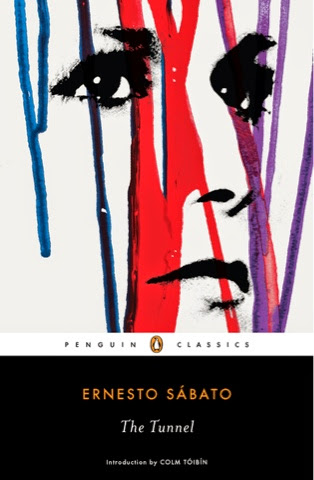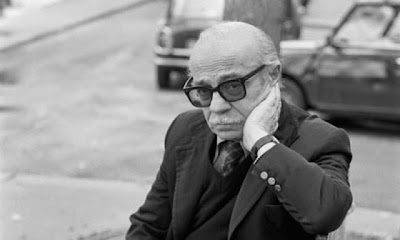“And yet she knew that in that very same moment she was enjoying so calmly, I was suffering the tortures of the damned in my personal hell of analyzing and imagining.”
In The Tunnel, Juan Pablo Castel recounts in an extremely lucid and rational way, his love for a woman named Maria Iribarne. He first sees her looking at one of his paintings with admiration and understanding; he then goes about the city of Buenes Aires looking for her. He waits endless hours until he does, in fact, catch up with her.
They begin a relationship, a love affair of great strength, which is slowly torn apart by his paranoia. We see him become increasingly irrational, but he tells his story so clearly it’s almost impossible to decipher his madness until his final actions. Like many important novels told from the point of view of a crazy person, here I’m thinking of The Catcher in the Rye, I wonder if the world around the narrator isn’t at least as crazy as he.
Quotes I highlighted from the text:
“The phrase ‘the good old days’ does not mean that bad things happened less frequently in the past, only – fortunately – that people simply forget what happened.”
“…for me memory is a glaring light illuminating a sordid museum of shame.”
“I am animated by the faint hope that someone will understand me – even if it is only one person.”
“…we all know that we have greater reason to detest the things we know well. But I have still another reason: THE CRITICS. They are a plague I have never understood. If I were a great surgeon, and some fellow who had never held a scalpel in his hand, who was not a doctor, and who had never so much as put a splint on a cat’s paw, tried to point out where I had gone wrong in my operation, what would people think?”
“Was our life nothing more than a sequence of anonymous screams in a desert of indifferent stars?”
“Dear God, how can you have faith in human nature when you think that a sewer and certain moment of Schumann or Brahms are connected by secret, shadowy, subterranean passageways.”
Ernesto Sabato (June 24, 1911 – April 30, 2011) was an Argentine writer, painter and physicist. According to the BBC he “won some of the most prestigious prizes in Hispanic literature” and “became very influential in the literary world throughout Latin America”. Upon his death El País dubbed him the “last classic writer in Argentine literature”.



I just read this one a couple weeks ago. (Thanks to the FIFA World Cup, I made a new friend from South America, and when he learned I blogged about books, he suggested this one) I really enjoyed it a lot. Especially the insight into the mind of an “artist.” His comments on “the critics” are amusing aren't they? I wonder where he got the inspiration for that… 🙂
LikeLike
Jay, how interesting that you just recently read this. Sabato made Juan Pablo sound almost rational, didn't he? Yes, I felt I had a window into the mind (and heart) of an artist as well. As for an opinion about critics, I want to remember that quote!
I'm not sure how to respond to you other than in my comments here; do you have a blog, or a place you'd like me to visit?
LikeLike
I love the sound of this book! Definitely something I would enjoy. I haven't read any book yet from the entire South American continent so I'm penciling this one for Argentina.
LikeLike
You won't be disappointed, Athira. For one minor point, I read it in two hours (it's short, I'm not a fast reader). Much more importantly, it's so interesting from a psychological point of view. It's not meant to convey Argentina, or even on country in particular, but rather to give us a glimpse into a tormented mind. I even loved the prologue by Colm Tobin.
LikeLike
Another one for the list, *sigh*. Two of your quotes have really hooked me: one on memory, and one on life as a 'sequence of anonymous screams in a desert of indifferent stars.' And that cover is very intriguing!
LikeLike
I realized I had to out the quotes in because they carried so much of the book I couldn't pinpoint in the review. Saga to has such a skill in writing brief sentences, or passages, which convey a lot of meaning.
While I don't agree with the anonymous screams in the desert of indifferent stars as a life view, I do understand feeling that way sometimes. See how he makes a crazy person in his narrative sound almost rational?
LikeLike
As much as I admire Sábato's heroism in standing up to the regime, and as much as I recognize the outstanding writing in The Tunnel, I found the book to be exceptionally unpleasant. It did help to learn some of its cultural/political context and to see it as an attack on machismo and its discontents as regards power in Argentina. But Castel and his paranoid pursuit of Maria are so loathsome that I found the novel unusually difficult going. Critics being an ignorant plague, though, I shouldn't hazard more than to say that it's not a book I look forward to revisiting any time soon.
LikeLike
I thought that reading the background of Sabato was quite helpful in understanding Castel's point of view. Although Colm Tolbin warned us in the prologue not to take this novel as specific to Argentina, how can we not knowing what Sabato was witness to? I agree with you it's not a book I look forward to revisiting either, and Castel is deplorable in word and action. Still, the novel kept my attention, and when I finished I felt I had a glimpse into the incomprehensible mind of a mad man. Who just kept getting crazier as his narrative progressed.
LikeLike
How interesting to see your review of this, Bellezza! I think Sabato was a good writer who tried too hard to be something more than that and fell on his face somewhat. At least, that was the impression I got from reading his 1961 On Heroes and Tombs which started great and then got incredibly stupid and implausible by the end. Unfortunately, it's about 5 or 6 times longer than I believe The Tunnel is so it kind of turned me off him for a while.
LikeLike
I bet you're surprised I “found” Sabato, as the other Spanish authors I've read this month have been more of the pulp fiction variety. Of course this is the only thing I've read of him, and it only took two hours so it was a brief introduction into his style. But I was very swept up in the mental processes of Juan Pablo, intrigued how his paranoia got hold of him and wouldn't let go. I can't say that was indicative of any set time or culture, but it sure was interesting from a psychological point of view. If not abhorrent as seraillon noted above.
LikeLike
Yes, I guess part of what surprised me is that most of the other writers you read for Spanish Lit Month were more “commercial” than Sabato outside of Latin American at least. However, a surprising number (to me) of bloggers I know have read The Tunnel, many of whom enjoyed it like you. Between you and Scott, I think I'd have a pretty good feel for what to expect out of the novel. The commercial/pulp fiction thing isn't a knock from me, by the way; I read and enjoyed my share of Pérez-Reverte novels when I was getting serious about studying/improving my Spanish again about 10 years ago. Cheers!
LikeLike
The Spanish authors I've known and loved are the women: Isabelle Allende, Sandra Cisneros, Julia Alvarez. It is just lately that I have ventured forth with the men, such as Roberto Bolano at your introduction.
I enjoyed the way that Perez-Reverte can create a dramatic story. Fabulous writing? Not so much. But, a very worthwhile plot in both the books of his I've read (the other being The Queen of The South).
Authors like Sabato have been unknown to me; the whole genre of Spanish literature is much more unfamiliar to me than others. But, I so appreciate you opening the door and showing me whom I have missed. I haven't progressed very far in Three Trapped Tigers, perhaps I will continue because I liked the beginning very much. It's just that Paris in July and my Japanese Literature Challenge 8 have also been calling.
LikeLike
I really enjoyed this one when I read it earlier this year. I can't help but feel that it should be better-known in the English-speaking reading world. (I do have a soft spot for confessional literature, so perhaps my bias is showing.) The translation I read was excellent, and the story was great as a psychological portrait and didn't seem to me to be particularly tied to any one place or culture. Although the story wasn't comfortable, I did think it was very well-crafted.
LikeLike
[…] Sábato’s existential classic, The Tunnel – it’s a book I picked up in July after reading Bellezza’s review for Spanish Lit […]
LikeLike